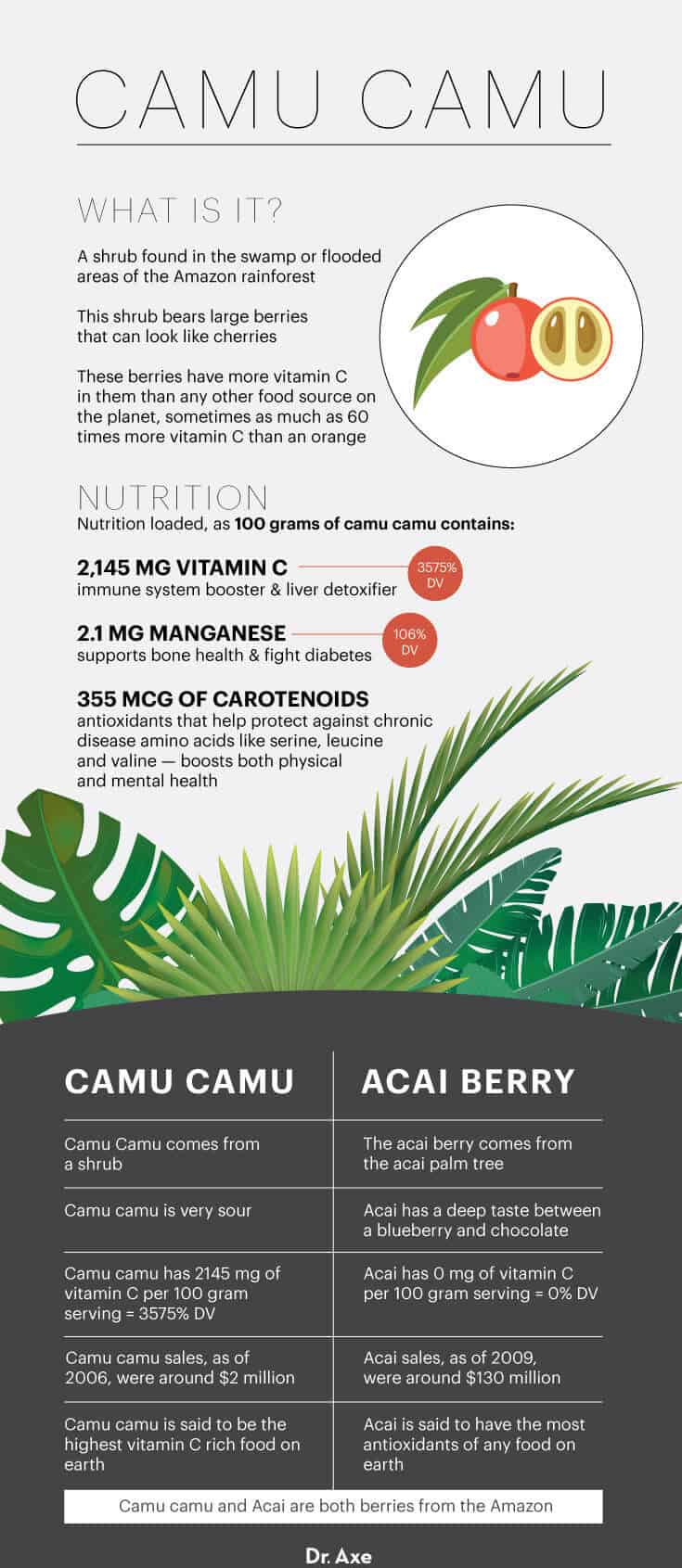Camu Camu: A New Superfood with the Most Vitamin C
January 2, 2020
Camu camu, a shrub found in flooded areas of the Amazon rainforest, may just be the next superfood to hit North American markets soon.
This shrub bears large berries that can look like cherries, and they turn out to be one of the top vitamin C foods in the world, according to researchers; in fact, camu camu powder has more of this vitamin than any other food on the planet, sometimes as much as 60 times more than an orange!
These berries are fairly new to to the global market, but their popularity worldwide is growing. So is it all a bunch of unwarranted hype, or is this Amazonian fruit truly as super as we think? Let’s see!
What Is Camu Camu?
The camu camu berry comes from the camu camu shrub (Myrciaria dubia), a small tree that’s a member of the myrtle (Myrtaceae) plant family.
Myrciaria dubia is related to the rumberry and guavaberry plants. Each wild shrub can yield around 26 pounds of berries per year. The berries, which are yellowish/red, tend to be very sour, which is why they are commonly ground into a powder and mixed with other foods, rather than eaten on their own.
Camu camu benefits include supporting inflammation, gum and eye health, and treating herpes, low moods, and much more. Animal studies demonstrate that camu camu has antioxidant and antigenotoxic effects.
Nutrition Facts
Camu camu presents a powerful concoction of phytochemicals, minerals and amino acids like serine, leucine and valine. It also contains an estimated 355 micrograms of carotenoids. In camu camu fruit, lutein is the dominating carotenoid along with beta-carotene and zeaxanthin.
Acerola and acai are two superfoods known for their extremely high vitamin C content, but camu actually provides even more vitamin C than both.
According to the Heal With Foods website, 100 grams of camu camu fruit (Myrciaria dubia)Â contains:
- 0.4 grams protein
- 0.2 grams fat
- 2145 milligrams vitamin C (3575 percent DV)
- 2.1 milligrams manganese (106 percent DV)
- 0.2 milligrams copper (10 percent DV)
- 0.5 milligrams iron (3 percent DV)
- 12.4 milligrams magnesium (3 percent DV)
- 15.7 milligrams calcium (2 percent DV)
- 83.8 milligrams potassium (2 percent DV)
- 0.4 milligrams zinc (2 percent DV)

Health Benefits
1. Supports the Immune System and Gut Health
What are the benefits of camu camu for the immune system? As mentioned above, this fruit has been found to contain one of the highest levels of vitamin C on the planet (especially ripe fruits grown in a commercial cultivation), in addition to other antioxidants such polyphenols and ellagic acid.
It can have 60 times more vitamin C than an orange and 56 times more than a lemon. This means that studies suggest camu may help feed the body the necessary nutrients it needs to properly recover from issues like the common cold or flu.
The dense punch of nutrients from camu can also support gut health and block free radicals and other pathogens from entering the body, according to studies, thus providing protection against bacterial infections, viruses and other issues.
Additionally, a 2018 animal study even found that camu may help prevent obesity by positively altering the gut microbiota (highly tied to immune function) and by increasing energy expenditure. Several studies found that camu could lead to lowered fat accumulation and blunted metabolic inflammation, leading to improved glucose tolerance and insulin sensitivity.
2. Improves Liver Health
As a powerful cocktail of antioxidants and phytochemicals, camu camu benefits the liver in several ways. The high vitamin C content is especially central to its ability to improve liver health.
For individuals with liver diseases like cirrhosis, the administration of vitamin C has shown positive outcomes. Research in 2010 showed that animals given camu camu powder showed significant signs of liver injury suppression. Specifically, an active compound called 1-methylmalate was isolated from Myrciaria dubia juice. This study concluded that the 1-methylmalate in camu is one of the reasons why it can aid liver health.
3. Enhances Mood
Camu camu berries’ high levels of vitamin C may help your brain to produce more serotonin, which will enhance your mood — which explains why it may act as a potential remedy for depression. In fact, research suggests people who have a deficiency in vitamin C often feel more depressed and lackadaisical.
Vitamin C is an important cofactor required for the conversion of tryptophan to 5-hydroxytryptophan in serotonin production. It’s therefore possible that vitamin C from camu camu benefits patients with depression that is associated with low levels of serotonin.
For example, in one study conducted at Montreal’s Jewish General Hospital, it was shown that many of the patients who had decreased levels of vitamin C reported signs of sluggishness and depression. When given doses of vitamin C, they all responded with rapid and clinically significant improvement in mood.
Related:Â Mood-Boosting Foods: 7 Foods for Greater Happiness
4. Improves Oral/Gum Health
Thanks to the powerful antioxidants and antiviral components of this fruit, benefits of camu camu include fighting against gum diseases like gingivitis. Studies have shown that antioxidant-rich remedies help reduce free radicals, which are causative inflammatory factors in the progression of gingival and periodontal health problems.
Some gum disease sufferers have report experiencing great results from taking two teaspoons of camu camu powder per day. Having healthy gums is also important since gum health is directly linked with heart health.
5. May Help Reduce Inflammation and Oxidative StressMyrciaria dubia has been studied for its possible ability to help slow and improve the aging process. It’s powerful antioxidants may help reduce oxidative stress, particularly in the elderly or among those with chronic pain. Nutrients in camu have also been found to help reduce inflammation such as by lowering inflammatory markers including interleukin (IL-6) and high sensitive C-reactive protein (hsCRP).
6. Supports Cardiovascular Health
Inflammation is a major root cause of many age-related diseases, such as heart disease, diabetes, Alzheimer’s and arthritis.
Camu camu berries are believed to act as powerful anti-inflammatory foods that help protect the heart and arteries against thickening and hardening (a risk factor for heart disease), while also improving blood sugar levels and insulin response. A 2018 study also found that camu could help improve vasodilation and blood pressure among young adults.
7. Helps Protect Vision and Eye Health
Camu camu fruit can also have a positive effect on eye issues like macular degeneration, which becomes more common with an increase in age.
Vitamin C and other essential nutrients can slow the progression of age-related macular degeneration and visual acuity loss. Age-related macular degeneration is the leading cause of blindness in people over age 55 in the Western world and the number of people with age-related macular degeneration is expected to triple by 2025.
How to Use
How do you take camu camu? The most popular form is camu camu powder, which is added to drinks and smoothies, or mixed with foods like oatmeal and yogurt. It can also be sprinkled on other types of cereals or used in baked goods, although cooking it at high temps may destroy some of the phytonutrients.
In recent years, it’s also been used in ice creams, frozen yogurts, popsicles and other sweets not only for the tart taste, but for its coloring capabilities.
- Camu camu berries can be very tart and unpleasant in terms of taste, so powdered versions are most popular as supplements.
- Camu camu powder dosage recommendations vary, but a typical dosage is about 1-3 teaspoons of powder per day. More than this may provide too much vitamin C and lead to side effects. When purchasing powder or supplements, always look for the correct species name Myrciaria dubia.
- In addition, you can find this fruit in pill form or as a juice, similar to acerola cherry or acai berry. The powder is easiest to find at stores, while the juice is harder to get in person, but is available online. Some studies have found positive effects using about 0.3 cups (70 ml) of camu juice daily.
- Some people also experiment with using skin cream, serums or skin masks made with camu because of the antioxidant and brightening effects of vitamin C. When used in oil form on the scalp, it can also boost the health of your hair.
Interesting Facts
Camu camu has been used by native Amazonian Indians for generations, but it was not looked at as a food source because of its highly sour taste. The levels of vitamin C in the berry are contingent on the growing region in the Amazon and growing conditions like soil composition and humidity levels.
Recently, this fruit has also been found to contain anthocyanins. Anthocyanins are water soluble pigments that may appear red, purple or blue depending on the pH, and they can be used for natural food coloring.
Because of the high levels of vitamin C, these berries can taste very sour. For that reason, locals who use the fruit for health purposes usually mix camu camu berries with milk and sugar, or sweeten them for use in jams and jellies.
Risks and Side Effects
Is camu camu safe? While it’s a natural berry and does not usually cause excessive side effects, it has not been studied extensively, so it’s possible that it may cause side effects in some people.
Because it contains a very high amount of vitamin C, when taken in large doses it can potentially lead to side effects such as: digestive issues like upset stomach, nausea, diarrhea and vomiting, as well as certain kidney issues. It may particularly negatively affect the digestive system in people who are susceptible to ulcers.
It’s possible that in pill or supplement form it might also interfere with some chemotherapy medications. Always consult your doctor before taking it if you are receiving treatment for any medical issues like cancer or if any other ongoing health concerns.
Is camu camu safe for pregnancy? It’s best to consume it in small amounts, due to its high vitamin C content, which in excess amounts (more than 1-3 teaspoons per day of powder) may have harmful effects during pregnancy.
Final Thoughts
- Camu camu fruit (Myrciaria dubia) is extremely tart and can look like a large cherry when picked. It’s typically ground into a powder and mixed with sweeteners or liquids to mask the sour taste.
- What are the benefits of camu camu? It packs around 50 times more vitamin C, 10 times more iron and three times more niacin than an orange.
- Animal studies have shown that it has antiviral, antioxidant and anti-genotoxic properties. It might help to improve your mood, boost your energy and support your nervous system.
- Regarding how much camu camu to take daily, a typical recommendation is to take between 1-3 teaspoons of powder per day. More than this may provide too much vitamin C and lead to side effects.

'Camu Camu: A New Superfood with the Most Vitamin C' has no comments
Be the first to comment this post!